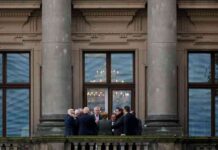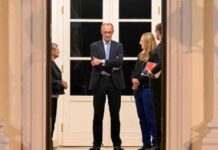The Rise of the FPÖ in Austrian Politics
On Sunday, Austria is gearing up for elections, with the right-wing nationalist Freedom Party of Austria (FPÖ) leading in all polls. Party leader Kickl could potentially become the first FPÖ Chancellor. In the city of Wels, an FPÖ government has been the norm for years.
A visit to Wels in Upper Austria immediately showcases the thriving state of the city. Immaculately restored houses line the town square, with affordable parking fees and a magnificent Baroque palace serving as the Town Hall. Since 2015, Andreas Rabl of the right-wing nationalist FPÖ has been serving as the Mayor, having been elected twice. A stroll through the streets and pedestrian zones reveals the visible impact of his FPÖ policies.
One noticeable feature is the presence of multiple surveillance cameras. For Mayor Rabl, these cameras play a vital role in his political agenda, aiming to ensure safety in Wels. Rabl emphasizes the benefits, stating, „It has an extremely good general preventative effect and has led to a significant increase in the subjective sense of security.“ Just a couple of streets away, a new police station has been inaugurated, with the city providing the building at a reasonable cost.
Cleanliness is another key aspect of Rabl’s vision for the 65,000-resident city of Wels. The goal is to eliminate any unsightly areas in Wels, with a significant reduction in vacant properties achieved through effective city management.
Challenges and Criticism
Mayor Andreas Rabl advocates for a „Law and Order“ approach, emphasizing the need for swift integration among migrants. According to Rabl, those coming to the city must adapt, learn the language, and become part of the society to ensure successful integration. This principle of integration as both a right and a duty extends to education and social services, with Rabl stating, „Integration is not only about rights but also about responsibilities, which must be enforced if not fulfilled.“
Critics view this approach as FPÖ propaganda, particularly in a city like Wels that relies on individuals from diverse cultural backgrounds to support its thriving economy. The approximately 4,000 local businesses depend on the influx of labor from various communities.
Johann Reindl-Schwaighofer and Christian Stöbich, who oppose the Mayor, are active in the Noitzmühle neighborhood, considered a social hotspot due to its high migrant population. Stöbich, from the Welser Initiative against Fascism, believes that the Mayor and the FPÖ are attempting to present a more moderate image. According to him, „The FPÖ can now sit back as the dominant city government, appear more moderate, calm fears that they previously generated.“
Reindl-Schwaighofer, a councilor for the Social Democratic Party (SPÖ), notes that many of the Mayor’s promises have not been fulfilled. For example, the policy of allocating housing only to migrants who speak German proved unfeasible. He also accuses the FPÖ Mayor of distinguishing between politically favorable and unfavorable migrants, highlighting the need for a fair and inclusive approach to integration.
National Policies and Electoral Prospects
As the nation gears up for the National Council elections, the FPÖ has once again capitalized on anti-immigrant sentiments in its campaign. The party’s platform advocates for a „Fortress Austria“ and a complete halt to immigration, drawing parallels with Hungary’s Prime Minister Viktor Orban’s policies.
In August, party leader and lead candidate Herbert Kickl outlined his migration policy, including restricting social benefits to Austrian citizens only and rejecting asylum applications within Austria. Kickl’s stance on halting mass immigration is seen as a means to prevent the influx of Islamist ideologies.
With the FPÖ consistently leading in polls, Kickl is poised to potentially become the first FPÖ Chancellor. Promising to be the people’s Chancellor, Kickl exudes confidence at campaign rallies, rallying his supporters to aim for victory in the upcoming elections.
Should Kickl emerge victorious and the FPÖ secure a governing position, it wouldn’t be the first time the right-wing nationalist party has held federal power. Since forming a coalition with the conservative Austrian People’s Party (ÖVP) in 2000 under former leader Jörg Haider, the FPÖ has maintained its electability.
Subsequently, the partnership between ÖVP Chancellor Sebastian Kurz and FPÖ leader Heinz-Christian Strache further solidified the FPÖ’s political presence. Currently, the FPÖ is also part of three regional governments: Upper Austria, Lower Austria, and since April 2023, Salzburg.
Mayor Rabl continues to garner support from his constituents, with residents expressing hope for the FPÖ’s success in the upcoming elections. However, critics remain wary of the FPÖ’s increasing influence, citing concerns about the party’s potential impact on democracy and its approach to historical issues, such as the Nazi era.
Reindl-Schwaighofer and Stöbich draw attention to the presence of Nazi-era remnants in Wels, such as a replica of a Roman statue that the Nazis often gifted as miniatures. Additionally, streets in the city are still named after Nazi functionaries like the Kuhnstraße, honoring Richard Kuhn, who developed the nerve gas Soman for Hitler’s war efforts.















